Schengen is for the lighter greens
Adelina Marini, June 29, 2011
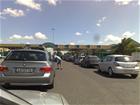 During the Apartheid in South Africa there was a political anecdote, which was more or less about the following: In an attempt to eradicate racial division, the authorities in South Africa have decided that there will be no more blacks and whites, all people will be green. As a result, at a bus stop the driver of the bus says: don't push each other, the lighter greens must be first.
During the Apartheid in South Africa there was a political anecdote, which was more or less about the following: In an attempt to eradicate racial division, the authorities in South Africa have decided that there will be no more blacks and whites, all people will be green. As a result, at a bus stop the driver of the bus says: don't push each other, the lighter greens must be first.
The same can be applied to the issue of Schengen in Europe. As we wrote not once, Schengen is not another pat on the back and a photo opportunity with big European leaders for provincial governments in unreformed countries. Schengen is the zone of evolved societies who are fully aware what security of citizens is and what it depends on.
This is why, when we talk about Schengen membership the CVM (the Cooperation and Verification Mechanism) must be a condition, no matter if this is found insulting by someone or not. We have to finally understand something very important - there is a direct and very obvious link between rule of law and Schengen membership, for the simple reason that the Schengen area is a zone of security and if only one member state fails with its obligations, then the security of all is jeopardised. As I have mentioned this many times - watch the euro area and think of Schengen.
It is no accident that EU leaders have written in their conclusions from the June European Council that a safeguard clause is envisaged, allowing the reinstate of internal border control in case of extraordinary circumstances. By the way, this safeguard clause is already a fact. I will give you just a few examples, which are more than eloquent of showing where we are and where Schengen is.
Who is who in Bulgaria?
Very recently, a Friday evening, I was driving on the Gurko street in Sofia, intending to go left on the 6th of September street (where the Ministry of Home Affairs is situated). A traffic policeman in a uniform was standing in the beginning of the street and was waving his hands, obviously trying to tell us that the street is closed. I could not resist and stopped to ask him why the street was closed. Probably you wouldn't doubt neither the way, nor the tone he used to tell me: "Because". This blew my patience and nerves, that were under pressure in the end of a hard taxpayer's week anyway.
I tried to explain to Mr Policeman, who obviously did not know that, who pays his salary, whose is the street and how is he expected to answer taxpayers' questions next time. I am not convinced whether he managed to learn his first lesson in democracy and rule of law, but he deigned to tell me after all that he did not know why the street was closed - this was an order. Whose order, an oral one or a written one this remained unclear. A little while after that two black jeeps, with darkened windows and arrogant lights in red and blue drove proudly on their own street. I have no idea who was in those jeeps - it could have been the Minister of Home Affairs and a Deputy Prime Minister himself, or could have been an imperial guest of his. I made a telling gesture just to demonstrate my resentment to such a behaviour.
An identical situation in Dublin during the historical visit of Queen Elisabeth II - the first since between Ireland and Britain peaceful relations have been established and only 10 years after the end of the serious hostilities between them, often expressed by frequent and bloody bomb attacks. I am giving these details just to give you a full picture of the scale of the threat for Her Majesty's security against the backdrop of the unclear threat for the security of whoever was in the two black jeeps in Sofia.
All the way the royal route was encircled and the police presence was impressive. But not even one of the policemen dared to behave as if he was the master and you - the slave. Smiling and with a "good day" they were explaining why you couldn't pass precisely through there, which is the shortest cut that could bring you where you wanted and on top of it they wished you a good day and apologised for the inconvenience. And I have to tell you that I was not the only one impressed by the police's behaviour. In the end of my visit an Irish friend of mine told me she felt a  proud Irish that week precisely because of the way the police ensured security without getting too deeply into the personal and professional lives of the Irish taxpayers in the capital.
proud Irish that week precisely because of the way the police ensured security without getting too deeply into the personal and professional lives of the Irish taxpayers in the capital.
I have seen similar situations in many other developed countries (and not that developed - for example Hungary), where the police is fully aware that it is meant to serve the people and does that with a deeply built-in respect for the taxpayer, of whose money he manages to buy food from the supermarket and to raise his kids after saving for a decent pension after having served his duty to the state - a consequence of his own choice. And these situations, especially compared to the incident I witnessed on the 6th of September street in Sofia, I share with you only to warm up, in order to illustrate who and how is being perceived here and in Europe. Here the policeman is the authority and the taxpayer is the subordinate, the one that is being kicked around and used. In Europe the policeman is a servant of society and the citizen is his employer.
And now toward a very Schengen incident
As we have mentioned several times, we in euinside love travelling by car through Europe, because many things can be seen pretty clearly - who and how fast is building motorways, how the law enforcement works, whether the cars are being upgraded (an indication for the situation of the economy) and, last but not least, what is the attitude towards the Bulgarian citizens. Unlike previous trips through Hungary, this time we "got lucky".
A little before entering Austria (as you know there are no borders - just a sign) we were overtaken by a police motor that was driving for a while behind us and than overtook us and invited us to follow him. We stopped at a parking lot, obviously used for a base of the mobile Schengen group, which includes representatives of the customs, the border and traffic police. It was evident that we were chosen on a random principle, although all of us in the car were sure that the Bulgarian license plate played a significant role in the choice.
We were asked to show our documents (in English), they were checked and we were not even asked to open the luggage trunk, which their colleagues on our entering Hungary did. No questions, no communication with the policemen. We were given our IDs back, we were smiled at and wished a safe trip. We then discussed that in fact if we lived on the other side of the Schengen border, we would have felt safe that we were being well protected. To some extent it was relaxing to see that there were also cars with Hungarian license plates at the parking lot. We asked ourselves whether it was possible such a thing to happen in Bulgaria too.
Similar scene was enacted on our way back, when we were stopped in Austria just before entering Hungary. The incident happened precisely where once was the border between the two countries. This section of the motorway was blocked by Austrian police cars who were filtering the traffic through only one lane and were stopping cars randomly. This time I am sure - the Bulgarian license plate proved to be tempting and attracted the sight of the policemen. We were immediately ordered to stop and a polite policewoman took our IDs and asked us to move aside where we rowed behind a Serbian van and a luxurious Mercedes with a German license plate but obviously owned by naturalised Turkish gastarbeiters (they can be recognised even from a distance with their darkened rear windows). Maybe they checked our documents and then gave them back to us politely, wishing us safe trip again. We passed easily against the backdrop of the van with an open trunk and front hood.
However, we were left with the feeling that we are not on the right side of the border. We felt somewhat darker green and convinced that only the face control, obviously perfect, "rescued" us from additional delay and humiliating taking out of our entire luggage. But still there is this bitterness that the Bulgarian plate is more a carrier of problems than of pride.
Why is that?
 I am telling you all this because it is not enough to equip in the latest fashion of technology and with Schengen money the border police and the customs, nor to repaint and renovate the border crossings (which is in fact quite worth praising but it is expected and obligatory, isn't it?). It is necessary to fulfill the conditions in the CVM and this to stop being perceived as an insult because it is not. The CVM has been introduced with the idea Bulgaria to succeed in completing the reform in the area of the judiciary and home affairs so that it could establish rule of law. This is still not a fact and for five years now we discuss the same things and the European Commission still is explaining to us that we now need more than a momentum for reforms, we need the reforms implemented.
I am telling you all this because it is not enough to equip in the latest fashion of technology and with Schengen money the border police and the customs, nor to repaint and renovate the border crossings (which is in fact quite worth praising but it is expected and obligatory, isn't it?). It is necessary to fulfill the conditions in the CVM and this to stop being perceived as an insult because it is not. The CVM has been introduced with the idea Bulgaria to succeed in completing the reform in the area of the judiciary and home affairs so that it could establish rule of law. This is still not a fact and for five years now we discuss the same things and the European Commission still is explaining to us that we now need more than a momentum for reforms, we need the reforms implemented.
Which is why the debate in the EU is being held precisely on this foundation - that allowing Bulgaria and Romania in Schengen will mean more corruption, more organised crime, more Roma citizens, hanging on the "generous social systems" in the developed countries. And it can't be any different, unless the Bulgarian state starts functioning by the rules, so that not only the other 26 countries trust it but its own citizens as well.
And to tell you the truth, no matter how insulting and humiliating it is for me to be from the darker greens, I fully understand why there are countries who are against Bulgaria becoming a member of Schengen. It is high time we, as citizens, rise against being darker green. Don't you want already to be from the a little lighter?
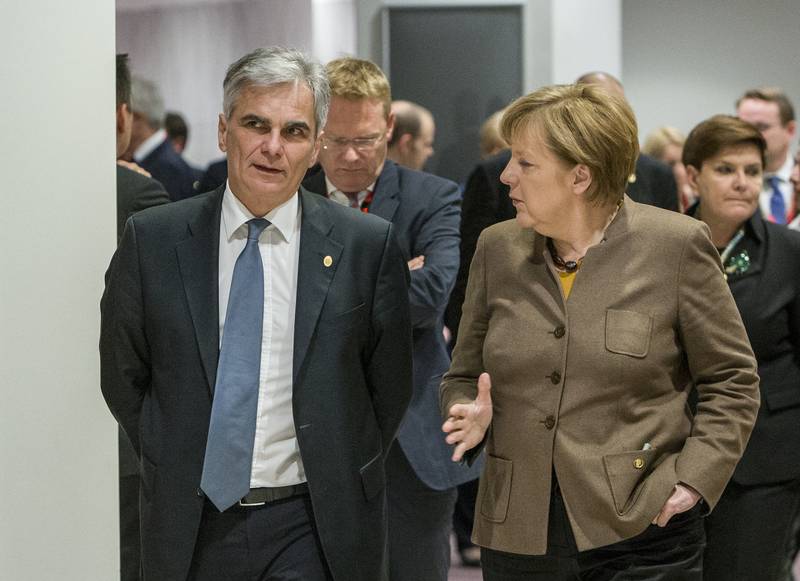 Werner Faymann, Angela Merkel | © Council of the EU
Werner Faymann, Angela Merkel | © Council of the EU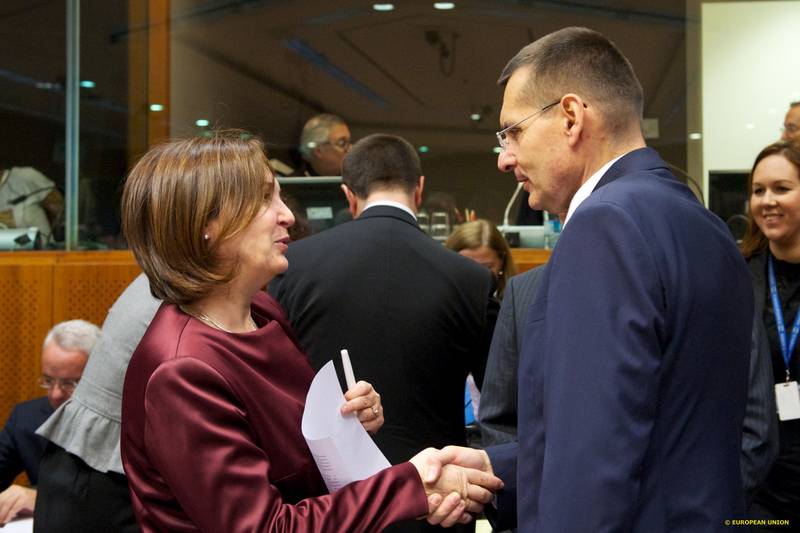 Rumyana Bachvarova, Petre Toba | © Council of the EU
Rumyana Bachvarova, Petre Toba | © Council of the EU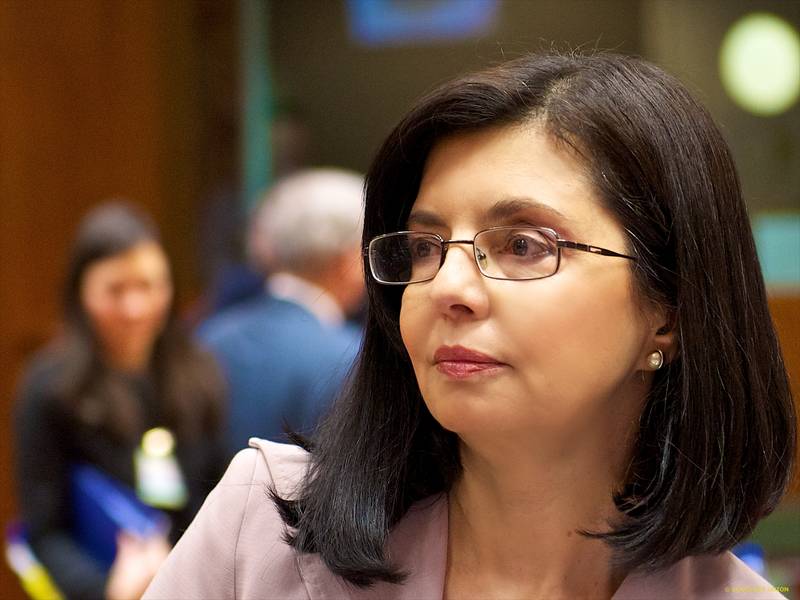 Meglena Kuneva | © Council of the EU
Meglena Kuneva | © Council of the EU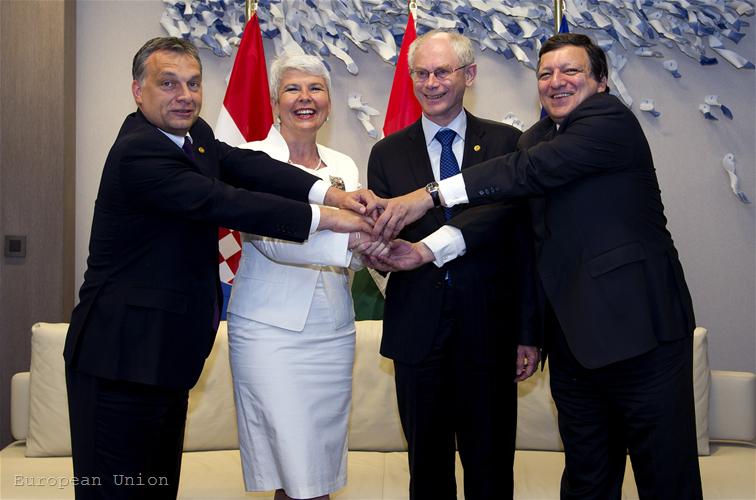 | © European Union
| © European Union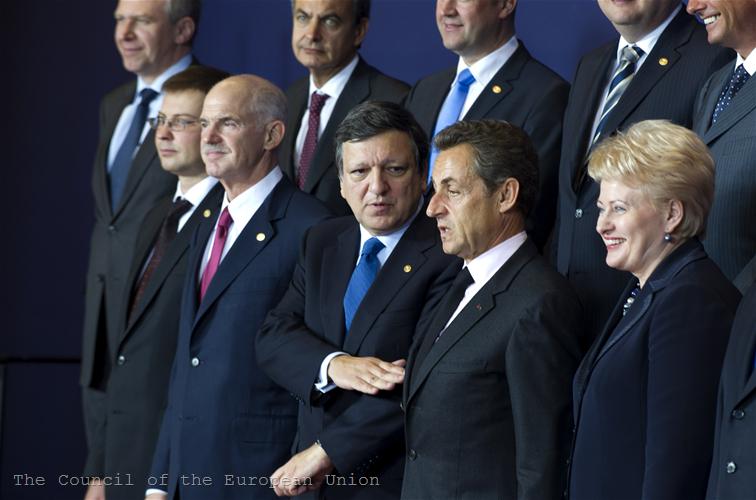 | © The Council of the European Union
| © The Council of the European Union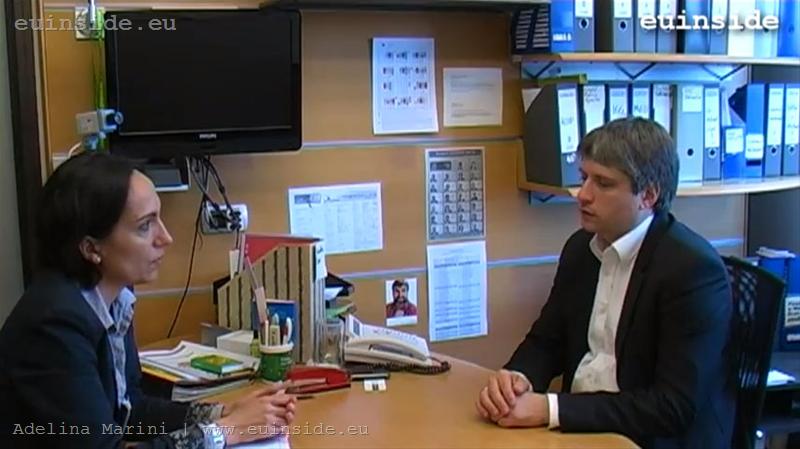 | © euinside
| © euinside